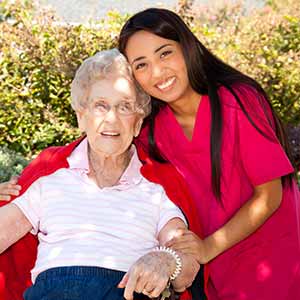Knowing that an elderly loved one can fall and suffer a permanent injury as a result of that fall is a disturbing thought. It also creates a lot of responsibility on your end. You want to do everything that you can to prevent something like that from happening. Still, even after installing handrails and making sure that tripping hazards are eliminated, there’s always an element of risk involved.
The good news is that there are a lot of risk factors that point to a heightened chance of suffering from a fall. You don’t necessarily need to take one of the risk assessment tests to know whether or not an elderly loved one might take a topple. If you believe that an elderly loved one is at risk of falling, then the sooner you take steps to help protect them, the better.

For example, things like incontinence, cognitive decline, the use of a cane or wheelchair, a history of falls, and many other factors can all increase someone’s chances of suffering a future fall. If these factors are in place, then you can be assured that taking preventative measures is a smart choice. However, just because those risk factors might not all be in place does not mean that prevention can’t help. Even if you’re not sure if a fall is likely, taking steps to prevent one before it happens has the potential to save your loved one a lot of misery.
Tests like the Timed Up & Go (TUG) have been shown to be accurate and reliable when it comes to assessing the needs of seniors. They are not prophetic, though. Rather, they should be treated as a way to evaluate warning signs rather than make a definitive judgment. Either way, a test might help you to put something in perspective that you have not been able to make a definitive decision regarding.
Having a loved one that has either suffered a fall, or is at a high risk of doing so, can be stressful. Some people take time off from work or even leave their job completely in order to help their parent or grandparent stay safe around the house. For some, this is a good choice, but it’s not right for everyone. For many others, hiring a professional care service to carry some of the burden is the better choice. If you fall into this latter category, in-home care might be just what you need. Not only is in-home care a lot more cost effective than a nursing home, it allows your loved one to stay in their own home and continue to maintain their own independence. This is a priceless opportunity.
Fall prevention is just one of the many potential questions you might have when it comes to bettering the life of an elderly loved one that you know. Regardless of what your senior care questions might be, we’d love to help you. You can give us a call and schedule a free consultation. Hopefully, we can set your mind at ease and help make sure that your care plans are headed in the right direction.


Leave a Reply